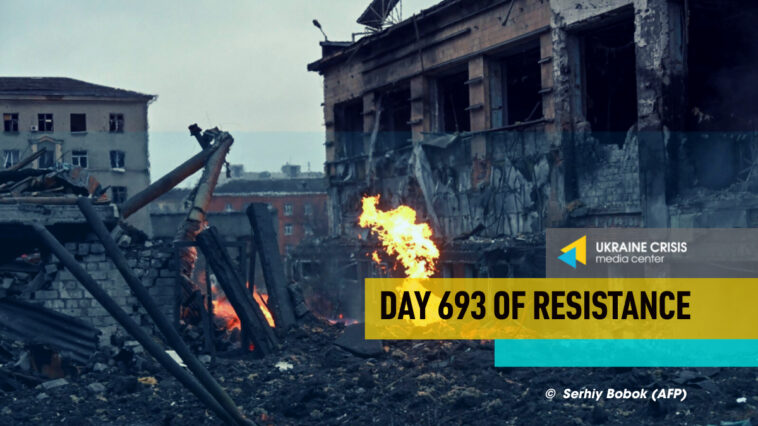A North Korean missile killing Ukrainian civilians is a “red line”, Zelenskyi says. Ukraine successfully uses a “hybrid” air defense system. The volumes of agricultural exports via the Black Sea have returned to near pre-war levels.
North Korean missile killing Ukrainian civilians is “red line”, Zelenskyi says
Responding to a journalist’s question in Davos about the red lines that North Korea should have not crossed, President Zelenskyi said that North Korea had sent more than one million artillery shells to Russia, but it was just the first step.
“This is about war. Artillery is about war on the battlefield. But there is a second step. These are already ‘red lines’, because these are missiles,” he said.
Russia launched a strike against civilians with a North Korean missile, causing civilian casualties, he explained.
“There was a North Korean-made missile that targeted civilians. Civilian people died. It did not happen on the battlefield or on the frontline. It was sent against civilians,” Zelenskyi said.
Russia has fired North Korean-supplied ballistic missiles into Ukraine, U.S. National Security Council Coordinator for Strategic Communications John Kirby said at a White House briefing on January 4. These North Korean ballistic missiles are capable of ranges of approximately 900 kilometers, he added.
The North Korean-made missiles were fired at Ukraine on December 30 and January 2, Kirby said. The missile fired on December 30 appears to have landed in an open field in the Zaporizhzhia region, he said. On January 2, Russia launched multiple North Korean ballistic missiles into Ukraine.
Permanent Representative of Ukraine to the United Nations, Serhiy Kyslytsya announced on January 5 that the United Nations Security Council will convene over Russia’s use of North Korean-made ballistic missiles against Ukraine. Speaking at a U.N. Security Council session on January 10, South Korean envoy Hwang Joon-kook said that North Korea uses Ukraine as the test site of its nuclear-capable missiles.
The Office of the Prosecutor General of Ukraine has the first evidence of Russia’s use of North Korean-made missiles against Ukraine, Prosecutor General Andriy Kostin said in televised comments on January 11. Russia fired a North Korean-supplied short-range ballistic missile into Kharkiv on January 2.
© facebook.com/prokuraturakharkiv
Ukraine successfully uses “hybrid” air defense system
Ukraine has successfully used a “hybrid” air defense system, destroying a Shahed drone at a nine-kilometer distance, Ukraine’s Minister of Strategic Industries, Oleksandr Kamyshin said, speaking at Ukraine House in Davos on January 17.
“We found a way to make what we call DIY air defense systems. We take old Soviet-legacy systems and adapt Western missiles to these systems, or we take Western launchers and missiles and integrate them into Soviet-legacy systems,” he explained.
“I am happy to announce that one of the systems had the first successful use last night. We took down a Shahed at a nine-kilometer range from a height of 400 meters. That’s the first use of this specific system,” Kamyshin said.
“I am happy that we have these systems in the battlefield, protecting our sky and our people,” he added.
In a tweet that followed, Kamyshin said one of the FrankenSAM air defenses systems was used. A project to create hybrid air defenses with the U.S. is called FrankenSAM.
Ukraine’s agricultural exports via Black Sea return to pre-war levels
The volumes of agricultural exports via the Black Sea have returned to near pre-war levels. Cargo insurance costs have dropped significantly, head of the Ukrainian Agrarian Confederation, Leonid Kozachenko told Ukrainian public radio.
Before the invasion, Ukraine mostly exported its grain through Black Sea terminals, he said.
“We used to export on average 7.5-8 million tons of grain per month. We have surpassed these levels and have almost restored the capacities. Terminals in Mykolayiv and Kherson are not operating, but they will be restored in the future. Current accomplishments are very important,” he said.
Ukraine “has deployed new weapons to the Black Sea shores.” They “destroy hostile targets that damage the transportation of grain,” Kozachenko said.
He also praised British support for Ukraine as the UK claimed ready to send planes to protect Black Sea vessels owned by British companies that carry grain shipments from Ukraine.
“It is very important that a British insurance company was the first to insure transportation services. There are four companies that insure transportation services, causing insurance costs to drop. Freight insurance now costs 1.25 per cent of the value of the goods being shipped, as opposed to seven per cent at the onset of the initiative. Insurance costs have dropped after we showed that we can protect the ships,” Kozachenko said.
He said finding a way to export agricultural products by sea is crucial for Ukrainian farmers. After logistics costs went up four times, they had to plant less winter grain.
A number of small and mid-size farms have tried to export their grain independently.
In the past two years, 1,500 more companies have tried to do so. These are primarily small firms that used to export grain to the EU by rail or road. Larger companies were exporting to the Middle East, China and India.
Sunak’s Ukraine visit and the Security Cooperation Agreement’s importance. Ukraine in Flames #560
In this episode of Ukraine in Flames we discuss Sunak’s visit to Ukraine on January 12, 2023, and what the newly signed Security Cooperation Agreement means for Ukraine’s future with experts Yehor Brailian, and Glen Grant. The experts delve into the pivotal moments, including the signing of the Security Cooperation Agreement – the inaugural bilateral accord within the Joint Declaration among the ‘Group of Seven’ countries. Explore Great Britain’s historical commitment to challenging situations, the leadership role in international support for Ukraine amidst perceived indifference from the US and Europe, and the anticipation of new military maritime cooperation, naval assets, and collaborative military production agreements aimed at deterring future hostilities. Take a watch of UIF #560 to find out more.
Guests:
- Yehor Brailian, PhD History, Analyst Detector Media
- Glen Grant, Defence Expert, Baltic Security Foundation

